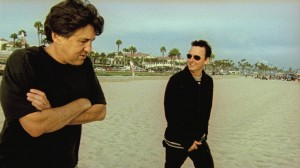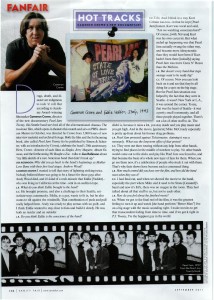PJ20 Interview with Vanity Fair
Cameron reunites with longtime friend and rock writer Lisa Robinson for an interview about Pearl Jam Twenty for the September issue of Vanity Fair. I’ve also included a scan of the interview below (courtesy of the amazing PJ site, Two Feet Thick).
Hot Tracks – Cameron Crowe’s New Documentary
Drugs, death and disaster are indigenous to rock ‘n’ roll. But according to Academy Award-winning filmmaker Cameron Crowe, director of the new documentary Pearl Jam Twenty, this band survived all the aforementioned dramas. The two-hour film, which opens in theaters this month and airs on PBS’s American Masters in October, was directed by Crowe from 3,000 hours of new interview material and archival footage. Both the film and forthcoming book, also called Pearl Jam Twenty (to be published by Simon & Schuster, with an introduction by Crowe), celebrate the band’s twentieth anniversary. Here, Crowe – director of such films as Singles, Jerry Maguire, Almost Famous, and the forthcoming We Bought A Zoo – talks to Lisa Robinson about “my little sketch of a rare American band that didn’t break up.”
Lisa Robinson: Why did you back to the band’s beginnings as Mother Love Bone with their first lead singer, Andrew Wood?
Cameron Crowe: I wanted to tell that story of lightning striking twice. Nobody believed there was going to be a future for those guys after Andy Wood died, and it’s kind of a rock miracle that Eddie [Vedder] – who was living in California at the time – sent in an audition tape.
L.R. What do you think Eddie brought to the band?
C.C. He brought promise, and also a challenge to their Seattle, set-in-their-ways community. Eddie, as a guy, wants to fit in, but he also wants to tilt against the windmills. That combination of push and pull really helped them. Andy was ready to play arenas with no guilt, and I think Eddie wanted to stay close to fans and build it slowly. He was both an insider and an outsider.
L.R. Do you think Eddie is the conscience of the band?
C.C. I do. And I think in a way Kurt Cobain was too – in that he kept [Pearl Jam] honest. Kurt was vocal and said, “Are we watching careerism here?” Of course, [with Nirvana] Kurt was his own careerist. But what ended up happening was that Pearl Jam actually swung the other way, and became more idiosyncratic than they would have been if Kurt hadn’t been there [initally] saying Pearl Jam was more Guns N’ Roses than the Melvins.
L.R. But doesn’t every band that steps onstage want to be really big?
C.C. Of course. Now you can look back on it and see that they’re all dying for a spot on the big stage. But the Pearl Jam situation was helped by the fact that they were in Seattle – it wasn’t New York or L.A., it was around the corner. To me, that was the heart of Seattle – it was a pretty small community, and all these people played together. There’s not a lot of other stuff to do. The cliche is, because it rains a lot, you stay inside and you play music and you get high. And in the movie, [guitarist] Mike McCready especially is pretty up-front about this former drug problems.
L.R. Pearl Jam protested against Ticketmaster, claiming it was a monopoly. What was the long-term effect of that protest?
C.C. They were out there touring without any help from other bands, trying to find places in the middle of nowhere to play. No other bands would come out to the sticks and play like Pearl Jam was forced to, and that became the basis of a whole new layer of fans for them. When you go see them now, it’s a celebration of people who stuck it out with them. That’s why their shows have become such a communal thing.
L.R. How much control did you have over the film, and how did the band react when they saw it?
C.C. I had final cut, and when we showed the movie to the band, especially the part where Mike said it used to be Stone [Gossard]’s band and now it’s Ed’s, there was no oxygen in the room. They had talked about that stuff to us, but not to each other.
L.R. How do you feel about the finished film?
C.C. When we got to the final reel of the film, it was the greatest feeling to turn it up and watch [the band perform”Better Man”] live on a big stage with the music sounding right. I make movies to get that transcendent feeling from time to time, and if we got it right in P.J. Twenty, I’m the happiest guy in the world.





